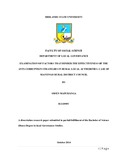Please use this identifier to cite or link to this item:
https://cris.library.msu.ac.zw//handle/11408/2353| Title: | Examination of factors that hinder the effectiveness of the anti-corruption strategies in rural local authorities. Case of Masvingo Rural District Council. | Authors: | Mapuranga, Owen | Keywords: | Corruption Anti-corruption strategies Local government management |
Issue Date: | Oct-2014 | Publisher: | Midlands State University | Abstract: | This study looks forward to examine factors that hinder the effectiveness of the anti corruption strategies for rural local authorities, case of Masvingo RDC. Corruption is affecting service delivery in various rural local authorities and Masvingo RDC was found to be one of the public organizations that are being haunted by it. Although there are anti-corruption strategies in place, their efforts are being whitewashed by the effects of corruption. Corruption still exists in Masvingo RDC and it is causing various negative impacts on rate payers due to poor service delivery. This however persuaded the researcher to examine the factors that are hindering the effectiveness of the anti-corruption strategies for Masvingo RDC and try to come up with a comprehensive tool that can effectively fight and contain corruption. With reference to material that had been read from various authors, scholars, publications and studies, the researcher has managed to identify factors that hinder the effectiveness, causes of corruption, effects of corruption and the effectiveness of the strategies in place. The mixed research design which is the combination of qualitative and quantitative techniques, was used in this study. The method was used so as to come up with balanced results as some scholars believe that qualitative and quantitative research complement each other. A sample size of 100 was used to represent the targeted population. The researcher used questionnaires to collect data in a bid to maximize use of limited time. Data was collected from council staff, councilors and the local residents. The researcher took advantage of a full council meeting where he distributed questionnaires to both council staff and councilors and later to the residents of Masvingo RDC. The researcher analyzed data gathered, making sure that it agrees with research objectives and answer the research questions. The findings of this research unearthed that corruption in form of bribes, nepotism, unnecessary travel and subsistence claims, fronting and misleading tendering is prevalent at Masvingo RDC. The research also revealed that the anti-corruption strategies for the institution are ineffective because they are reactive to challenges. The researcher further discovered that poor policy implementation, uncertainty of politics and the public’s lack of political will are other factors that hinder the effectiveness of the anti-corruption strategies. The researcher recommended that a code of ethics, a well defined whistle blowing procedure and better salaries are needed to strengthen the strategies in place and to better fight, reduce and contain corruption. | URI: | http://hdl.handle.net/11408/2353 |
| Appears in Collections: | Bsc Local Governance Studies Honours Degree |
Files in This Item:
| File | Description | Size | Format | |
|---|---|---|---|---|
| Mapuranga.pdf | Full text | 1.7 MB | Adobe PDF |  View/Open |
Page view(s)
198
checked on Feb 14, 2026
Download(s)
122
checked on Feb 14, 2026
Google ScholarTM
Check
Items in MSUIR are protected by copyright, with all rights reserved, unless otherwise indicated.



